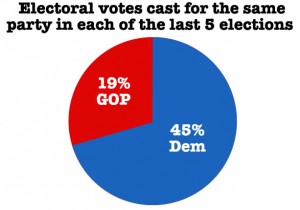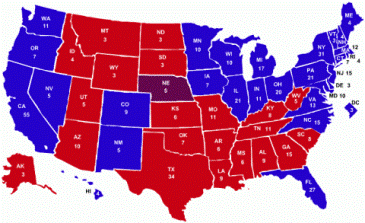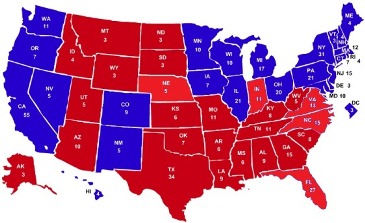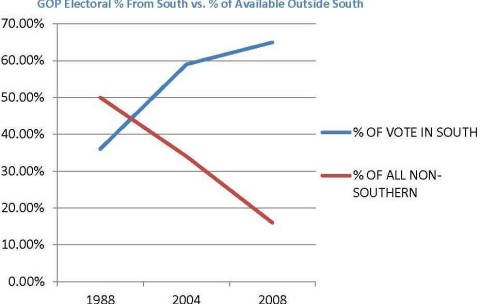I have always said that, for me, politics is one of the best "spectator sports" going. This reality came home to me once again as I prepared for an upcoming oration on recent changes -- and continuities -- in southern politics. In much the same way that TV sports commentators will do their dead-level best to create a sense of drama or uncertainly about the outcome of an arm wrestling contest between Arnold Schwarzenegger and Pee Wee Herman -- "Well, Arnie pinned him again, but it took him nearly twelve nanoseconds, and Pee Wee barely whimpered this time" -- so do political reporters leap to embrace any signs that the front runner is losing ground.
In presidential politics, the best places to find at least some faint suggestion that the race might be getting more competitive are national preference polls, such as recent Gallup and Mason-Dixon surveys showing that Mitt Romney now has a 3 percent popular vote advantage over Barrack Obama. Certainly, such polls are not to be dismissed out of hand, especially if they begin to show a cumulative shift in favor of the challenger, but provided you didn't sleep through eighth grade civics, you may recall that we don't actually choose our president according to the popular vote. If, by chance this had slipped by you, you can your eco-friendly Range Rover that Ozone Al Gore will never forget it, and neither should anybody just itching at this point to lay down big money that President Obama will be sent packing in November.
As my friend and UGA colleague, the uber-eminent political scientist Charles Bullock, has suggested -- and as I am sure the Romney insiders understand all too well -- when we complicate matters by throwing recent trends in the Electoral College into the mix, it all boils down to the fact that eighteen states, plus the District of Columbia, have voted Democratic in the last five presidential elections. As the cutesy little pie chart below indicates, these states account for 45 percent of all the electoral votes out there, not to mention 90 percent of the 270 votes required to win the presidency. On the other side of the ledger, thirteen states have done right by the GOP in each of the last five elections, but they currently represent only 102 electoral votes. (Note for future reference that 69 of these come from the South.)

Even if you throw in the states that have voted Republican only three of the last five times out, you are talking 219 electoral votes. In other words, Obama can get to 242 electoral votes just by carrying states that haven't voted Republican in a generation, while the Ol' Mittster has to carry all the states that have been equally loyal to the GOP, plus those that have deserted the party not once but twice over the same span, just to get to 219, where he would still be trailing Obama by 23 votes.
As it happens, three of these "must-win- just-to-get-to-219,"states for Romney are Florida (now with 29 electoral votes and thus as big a prize as New York), North Carolina (15), and Virginia (13), the three southern states that Obama confounded the pundit majority by winning four years ago. This means that not only can Obama win even if Romney reclaims the 59 electoral votes these southern states represent, but, based on his 2008 showing, he would still have 24 votes left to play with and could even see Indiana retreat to its familiar Redness (as seems likely) while still enjoying a 13-vote cushion.
Thus, where the 2008 electoral map looked like this:

Obama can win in 2012 even if the map looks like this:

This latter point is worth lingering over, because scarcely thirty years ago, coming out of the 1980s when the high flying GOP swept the South three times, we were told again and again that the Democrats would never claim the presidency again until they could at least make a dent in the now solidly Republican South. The only problem with this truism was that it was false. Not once in the 1980s could a Democratic presidential candidate have won by carrying every southern state because even though, save for Georgia in 1980, the Repubs had swept the South every time out, they had darn near swept the nation each time as well.
In 1984, for example, southern voters accounted for only 30 percent of Ronald Reagan's electoral total. It was true enough that in breaking the Republicans' stranglehold on the White House and keeping them at bay for a second term, Bill Clinton had picked up four southern states, albeit not the same four, each time, but here again, none of them had been essential to either of his victories. "W." managed to bring the defecting southern states (Ark., Fla., Ga., Tenn., La.) back into the fold in 2000 (though only in Florida's case by the skin of a hanging chad and an ethically challenged jurist or two) and 2004, but it was noteworthy, to be sure, that where Clinton's victories hadn't depended on any of these states, Bush needed all of them in his first run and all but two in his second.
As the crude graph below indicates, whereas Papa Bush had gotten 36 percent of his electoral votes inside the South and 50 percent of the electoral votes available outside the region, twenty years later, a hapless John McCain had to look south for 65 percent of his tally while getting only 16 percent of the non-southern electoral total.

There's no doubt that the virtual assurance of an indelibly "Red" base in the South, which allowed them to concentrate their energy and resources elsewhere, contributed to Republicans' success throughout the nation in the 1980s. However, what we were seeing increasingly thereafter was the "southernization" not of America but of the Republican Party, and at the same time that ethnic, generational, and other demographic shifts were gradually translating into a viable Blue-state base outside the region.
The 2008 election even suggested that these shifts might be inducing a gradual "purpling" of southern politics, although the emphasis here should definitely be on "gradual." Barack Obama won North Carolina after carrying seven of its eight largest metropolitan counties by substantial and likely unrepeatable margins, but he also owes more than a tip of his golf hat to Libertarian candidate Bob Barr for slurping up well over 25,000 votes in a race where the victory margin was slightly more than 14,000. In light of the Tar Heel State's recent vote on an anti-gay marriage amendment, it stands to reason that Obama's angst-ridden announcement that he now sees it the other way may not do him a whole lot of good in that state.
As to Virginia, a recent Washington Post poll actually shows Obama leading by seven points, which would be pretty consistent with his six-point victory there four years ago. Obama improved on John Kerry's 2004 Virginia performance with both whites and blacks in a state where the overall minority share of the total vote increased by 7 percent over 2004. This figure rose by 5 percent in 2008 in Florida, where the polls currently show a virtual dead heat. Obama won here four years ago by holding on to John Kerry's 42 percent of the white vote, while besting Kerry's share of the black vote by ten points and of the Hispanic vote by thirteen. Many doubt Obama's ability to generate such a minority turnout this time around (especially in light of certain restrictive voting statutes now on the books in these states and elsewhere) and point out that white turnout was lower than expected in both these states in 2008. They are probably right in Obama's case, but then again, are we simply to assume that hard-line conservative white voters in the South who apparently had a hard time mustering much enthusiasm for John McCain are suddenly going to start jonesing for Mitt "Mr. Closet Moderate"Romney?
Among the southern states, Virginia and Florida are apparently the least overrun by evangelicals, and this may also make the Prez's task of holding onto them a little less arduous. At any rate, from where I sit, Obama's prospects look better in Virginia and Florida than in North Carolina. Although I wouldn't be ready to bet my burial fund nest egg on him just yet in either of these places, from a historical perspective, it remains a bit hard for me to believe that a black Democrat has not only carried three southern states on his way to claiming the presidency, but has at least a shot at hanging on to a couple of them the second time around. From the standpoint of future implications, however, whether he manages to pull this off or not may be no more significant than whether it affects the outcome this time any more than it did four years ago.